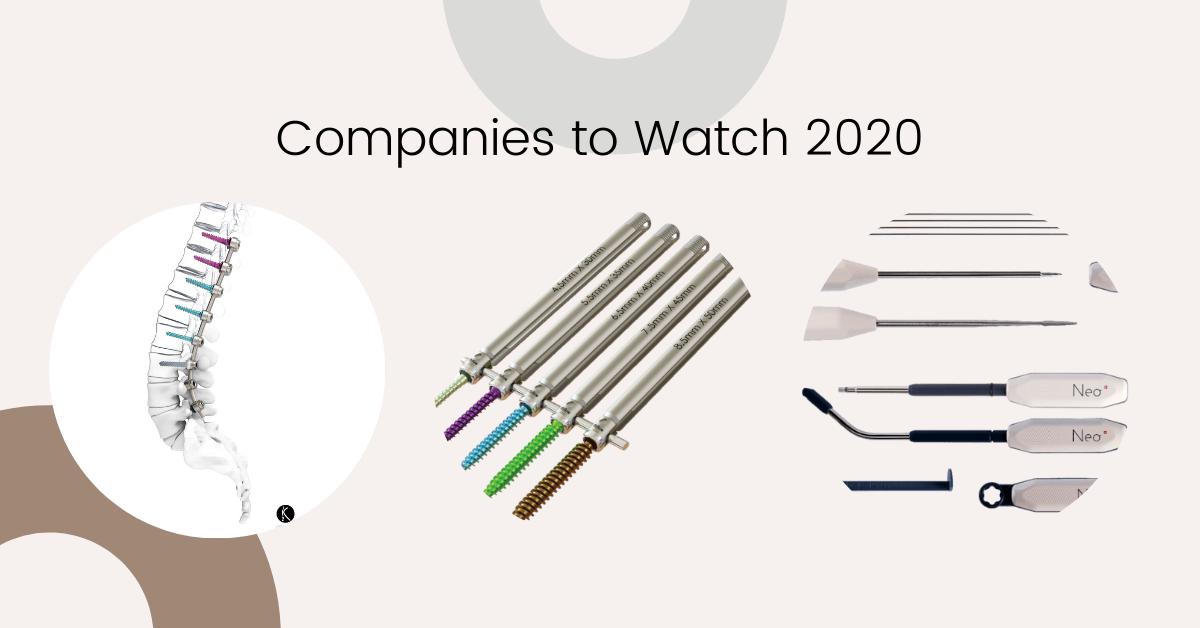We have reached that time of year again for annual medical device conferences and exhibitions – events that act as a playground for everyone from startups to multinational ‘strategics’ to showcase the fruits of their labour to customers. Not only do these meetings present countless opportunities for technology and material manufacturers to attract new clients, they also offer educational support for surgeons; allow distributors to meet potential partners and serve as an ideal environment for headhunters to network with new candidates.
However as we continue to adapt to the current climate, we must now accept virtual conferences as this year’s ‘normal.’ For the past three years, I have travelled to Orlando, Los Angeles and Chicago to build my network, increase my knowledge and further my understanding at the North American Spine Society’s (NASS) annual meeting. I was also looking forward to attending this year’s expo – alas, our clients, candidates and Disneyland’s Galaxy’s Edge will have to wait for now.
With this year’s NASS taking the form of a virtual meeting, I would like to talk a little about some of the up and coming companies who were due to exhibit – those I believe to represent the future of spine. Over the next couple of weeks, we will post a series of short interviews with soon-to-be stars of the industry, including:
Astura Medical
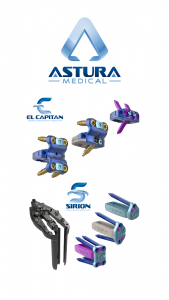
Founded in 2014, Astura Medical is governed by a single aim: to bring best-in-class instrumentation and implants to independent distributors and surgeons. As such, the company doesn’t have physician ownership and steers away from any physician-owned distributorships, while adopting best practices at every stage of developing manufacturing, and commercial distribution of its technology.
Unlike other companies that provide generic or standard instruments, what makes Astura Medical a cut above the rest is its attention to detail for every aspect of each implant and instrument. This meticulous approach has not only garnered Astura Medical a reputation for unparalleled instruments, but has been the driving force to it becoming one of the fastest growing companies in ‘spine’ today.
HT Medical (edit: now Xenix)
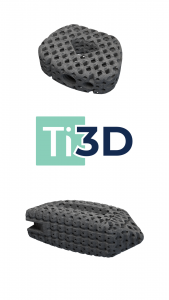
HT Medical is a relatively new medical device company focused on helping spine patients reclaim their lives as quickly as possible by creating differentiated, highly-engineered products. The company’s goal is to disrupt the spinal implant industry with its proprietary Ti3D Technology™ that consists of a 3D-printed, uniformly porous interbody device matrix.
The aim? To reduce stiffness and provide a load-dispersing Snowshoe Effect™ to lessen the potential for implant subsidence. The Ti3D™ platform also incorporates the company’s proprietary surface technology to accelerate cellular attachment and proliferation for implant osseointegration. The company has recently began its journey to scale itself into a spinal implant market leader with an emphasis on science, collaboration and fusion-focused innovation.
MiRus Medical
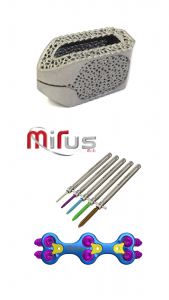
MiRus, LLC is a rapid growing medical device company based in Atlanta, GA whose initial focus is in bringing innovative products into spine market. Led by Founder & CEO, Dr. Jay Yadav, MiRus has received FDA clearance for a new Superalloy called MoRe™ (Molybdenum Rhenium) that will be a catalyst for disruption in the orthopaedic and spine space, with a new wave of more durable, bio friendly, thinner and low profile implants yet stronger and more fatigue resistant than currently available alloys like Titanium and Cobalt Chrome.
With the best-in-class MoReTM based expandable and static interbodies posterior cervical, adult and pediatric deformity, corpectomy, SI Joint implants on the horizon for 2021, MiRus is rapidly developing products in their new 50,000 sqft facility to match surgeon needs for their patients. In addition, their impending launch on pre- and post- operative solutions towards measuring outcomes, risk stratification, surgical planning and analytics platform, MiRus is clearly positioned to be an industry leader in Orthopaedics and beyond, with all the innovations focused on increasing patient satisfaction, improving population health, and lowering overall costs.
NEO Medical

Neo Medical is a new leader in value-based care technologies for spine. Through the development of peri-operatively integrated platforms, Neo is helping improve clinical outcomes and lower overall costs while reducing the environmental footprint of the industry.
Neo’s exclusive controlled fixation pedicle screw platform is designed to reduce screw loosening and implant failure through the use of five key multi-functional, disposable instruments and universal sterile implants that provide enhanced functionality and tactile feedback capabilities.
This is coupled with Neo’s enhanced fusion posterior cage platform, designed with a bullet nose and rotational rails for reproducible anterior cage placement through the use of six key multi-functional disposable instruments along with utilizing a proprietary 3D cage printing algorithm for best in class osteoinductive properties and grip to endplates.
SMAIO
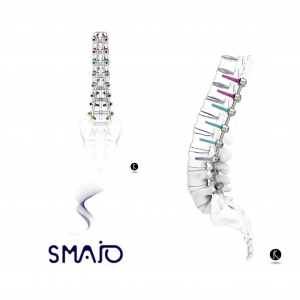
SMAIO (Software, Machines and Adaptative Implants in Orthopedics) is a French spine company founded in 2009, specialising in personalised medicine by offering a comprehensive solution including spinal implants and software.
With its long history in data management and 3D software reconstruction, SMAIO has a double objective: sustainability and efficiency of any surgery.
- Sustainability: restore or preserve the biomechanical spino-pelvic balance (with a focus on sagittal balance) and standardise the surgical procedure, both with the aim of reaching an accurate result and limiting the need for revision surgery.
- Efficiency: provide the patient with a measurable improvement in quality of life and functional capacities.
To achieve these objectives, SMAIO is offering solutions to spine surgeons combining its advanced planning software and support from bio-engineer experts with education and training as well as an innovative pedicle screw system and personalised implants.
SpineEx
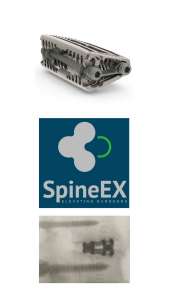
SpineEX® is an FDA cleared, first-to-market, commercial stage, fully adjustable spinal device technology company. SpineEX® offers full surgical implantable systems and techniques that are patient-specific, intuitive and economical. Its mission is to improve the quality of life for patients suffering from spine-related issues and diseases by providing personalised surgical solutions along with addressing current surgical inefficiencies present in the operating room today.
The flagship product Sagittae® is a complete lateral system and currently the only spinal interbody implant technology with dual-axis or two-degrees of freedom allowing for the ultimate patient-specific fit along with a surgically efficient technique. To date, SpineEX has been successfully moving through its limited market release with multiple surgeon users achieving positive operative and post-operative follow-up results through demonstrating improvements in sagittal balance correction.
In addition to the lateral system, SpineEX is committed to rounding out its lumbar fusion offering by adding both anterior and posterior patient-specific interbody platforms.
While I have chosen to focus on these six companies, there are other standout small businesses in spine, too. This year saw Nanovis become the first spinal implant manufacturer to be awarded nanotechnology designation for its pedicle screw and with more products in the pipeline, it’s another ‘one to watch’ next year. In spinal imaging, 7D Surgical – which recently completed its largest financing round to date – and Augmedics continue to lead the way and in the biologics space, Kuros Biosciences is primed for a strong 2021.
2020 has looked dramatically different to the year we expected but now, faced with virtual conferences, some of my smaller clients are predicting a lack of fanfare and huge booths could help level the playing field when it comes to commanding attention. Others also argue that, in the world of spinal implants, the market has stagnated in recent years. While that may be true to some extent, I am very optimistic that these companies – brimming with passion, innovation and ingenuity – combined with an influx of exciting, cutting edge technologies could spell the start of a vibrant new era in spine.
At Talanoa, our aim is to be at the forefront of innovative medical technologies. We know candidates we represent will only be interested in the most disruptive solutions. Connect with Matthew on LinkedIn and schedule your online consultation to learn more about building a successful team in MedTech.

